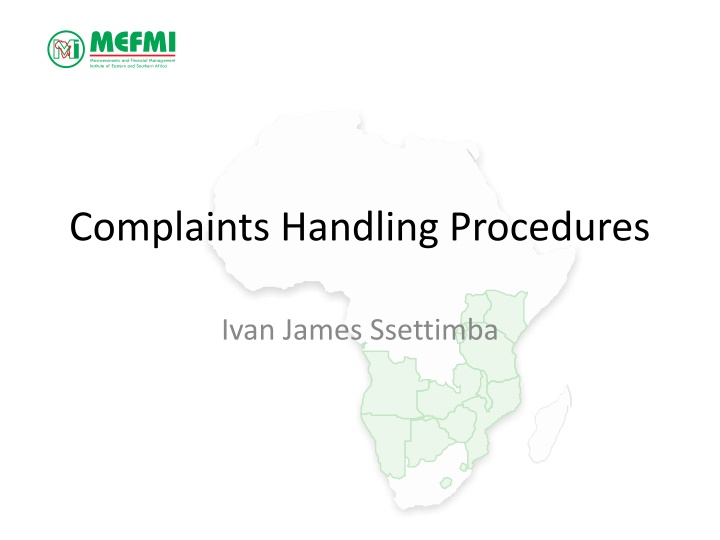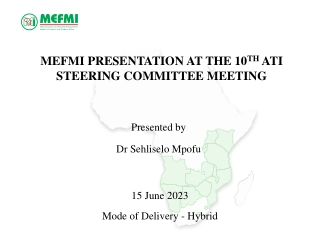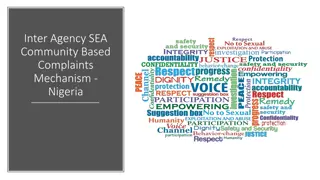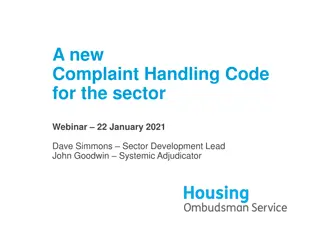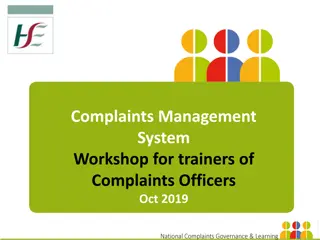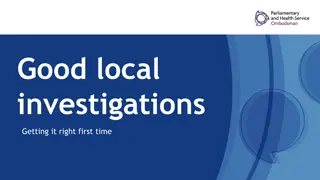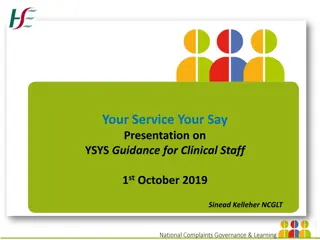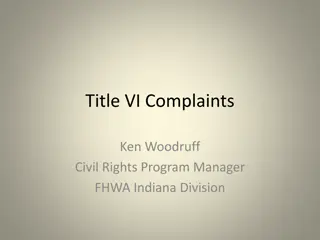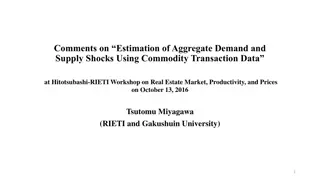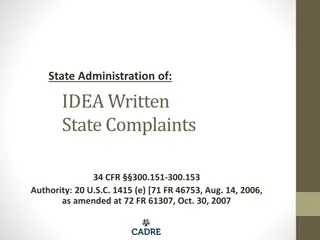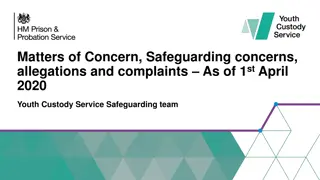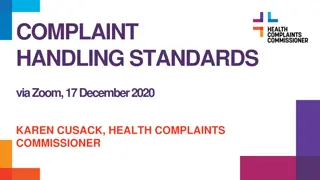Complaints Handling Procedures at Macroeconomic and Financial Management Institute
Effective complaints handling is essential for feedback and improvement in financial services. Learn about the benefits, principles, and responsibilities involved in managing complaints at the Macroeconomic and Financial Management Institute of Eastern and Southern Africa.
Download Presentation

Please find below an Image/Link to download the presentation.
The content on the website is provided AS IS for your information and personal use only. It may not be sold, licensed, or shared on other websites without obtaining consent from the author.If you encounter any issues during the download, it is possible that the publisher has removed the file from their server.
You are allowed to download the files provided on this website for personal or commercial use, subject to the condition that they are used lawfully. All files are the property of their respective owners.
The content on the website is provided AS IS for your information and personal use only. It may not be sold, licensed, or shared on other websites without obtaining consent from the author.
E N D
Presentation Transcript
Macroeconomic and Financial Management Institute of Eastern and Southern Africa Complaints Handling Procedures Ivan James Ssettimba
Outline Macroeconomic and Financial Management Institute of Eastern and Southern Africa Introduction Benefits of Complaints Handling Effective Complaints Handling System Principles of Effective Complaints Handling Fit for purpose complaints handling system Complaints Handling Officers Responsibilities of Regulators Conclusion
Introduction Macroeconomic and Financial Management Institute of Eastern and Southern Africa Complaints provide feedback to management of an FSP in regard to the services that are being offered. A complaint is an expression of dissatisfaction made to or about a FSP, related to its products, services, staff or the handling of a complaint, where a response or resolution is explicitly or implicitly expected or legally required . Complaints should be made first to the FSP by members of the public and/or customers, but seek redress from the central bank Effective complaint handling is fundamental to the provision of a quality service.
Institute of Eastern and Southern Africa Benefits of Complaints Handling Macroeconomic and Financial Management Key benefits of effective complaint handling system to a FSP: It resolves issues raised by a customer who is dissatisfied in a timely and cost- effective way; It provides information that can lead to improvements in service delivery; and Where complaints are handled properly, a good system can improve the reputation of a FSP and strengthen customer confidence The customers want: The FSP needs A user friendly complaint handling system A user friendly system for accepting feedback To be heard and understood Clear delegations & procedures for staff to deal with complaints and provide remedies To be respected A recording system to capture complaint data An explanation To use complaint data to identify problems and trends An apology To improve service delivery in identified areas Action as soon as possible
Institute of Eastern and Southern Africa Effective Complaints Handling System Macroeconomic and Financial Management
Macroeconomic and Financial Management Institute of Eastern and Southern Africa Principles of Effective Complaints Handling Customer focused: The FSP should be committed to effective complaint handling and values feedback through complaints. FSPs should be open to feedback and committed to seeking appropriate resolution of all complaints and addressing policy and process inadequacies highlighted by them. Commitment should be communicated to all staff, stakeholders and clients FSPs should have a clearly communicated complaint handling process Visibility: Information about how and where to complain is well publicised to customers, staff and other interested parties. Information should be available at various service delivery points including posters at branches and on websites. Front-line staff should be aware of the complaint handling process The information about how to complain should identify any appropriate alternative external parties the complainant can go to with their complaint
Macroeconomic and Financial Management Institute of Eastern and Southern Africa Principles of Effective of Complaints Handling Accessibility: The process of making a complaint and investigating it is easy for complainants to access and understand. Complaints should be handled at no charge Information about the complaints process should be available in a variety of forms of communication, formats and languages appropriate to the needs of the customer. Complaints should be accepted in a number of different ways e.g. in person, over the phone, and in writing via email, fax and letter, and, where appropriate, access to translating and interpreting services should be provided. Responsiveness: Complaints are acknowledged in a timely manner, addressed promptly and according to order of urgency, and the complainant is kept informed throughout the process. Provide guidance on how to respond and prioritize complaints Acknowledge receipt of complaints promptly
Macroeconomic and Financial Management Institute of Eastern and Southern Africa Principles of Effective of Complaints Handling Complaints should be addressed promptly in order of urgency and staff should be aware of any target timelines for resolving complaints. Complaint Handling Officers should be empowered to either resolve complaints or be aware of, and have access to, the person who has the authority to do so.
Macroeconomic and Financial Management Institute of Eastern and Southern Africa Principles of Effective of Complaints Handling Objectivity and fairness: Complaints are dealt with in an equitable, objective and unbiased manner. This will ensure fairness and reasonableness. All complaints should be dealt with on their merit in an equitable, objective and unbiased manner. Any conflicts of interest should be declared. Complainant should be, given sufficient opportunity to present their position, to comment on any adverse findings and is provided with reasons for decisions on the outcome of the complaint. Decisions should be reviewed by a suitably experienced officer before the complaint is finalised. There should also be an independent internal review or appeal process. Training and guidance should be provided to those handling complaints Confidentiality: Personal information related to complaints is kept confidential. The personal information of the complainant should be kept confidential and only used for the purposes of addressing the complaint and any follow up actions.
Macroeconomic and Financial Management Institute of Eastern and Southern Africa Principles of Effective of Complaints Handling Remedy: If a complaint is upheld, the FSP provides a remedy. Mechanisms should exist for enabling appropriate remedies to be provided when complaints are upheld and staff should be familiar with them. Staff should be able to give the complainant reasons for decisions relating to remedies. Staff should be empowered to provide these remedies at the appropriate level, for example some appropriate remedies may be provided by front-line staff. Review: There are opportunities for internal and external review and/or appeal about the FSD s response to the complaint, and the complainants are informed about these avenues. There should be an independent internal review or appeal process. Details of external rights of review or appeal for unresolved complaints should be made available to complainants. Accountability: Accountabilities for complaint handling are clearly established, and complaints and responses to them are monitored and reported to management and other stakeholders.
Macroeconomic and Financial Management Institute of Eastern and Southern Africa Principles of Effective of Complaints Handling Assign specific officers to handle complaints Have in place a fit for purpose system to record and track complaints
Macroeconomic and Financial Management Institute of Eastern and Southern Africa Principles of Effective of Complaints Handling Complaints and actual or proposed improvements to practices should form part of the FSP s internal reporting and planning process Remedies and proposed improvements to practices should be followed up and acted on. Records of complaints should be kept according to the established record keeping policies Effectiveness of complaints handling process should be monitored by Internal audit Continuous Improvement: Complaints are a source of improvement for FSPs. Use complaints data to identify recurring issues and come up with process or service improvement
Macroeconomic and Financial Management Institute of Eastern and Southern Africa Fit for purpose complaints handling system System that is appropriate for the FSP given number and type of complaints received, could be a simple spread sheet or a customised off the self system System to be deployed should take into consideration the following: The number and demographics of the FSP s customers, and how they generally communicate with the institution; The nature and breadth of the FSP s interactions with the public; The level of complaints that is considered reasonable for the FSP (by examining trends in its level of complaints over time and industry benchmarks); The FSP s risk management strategy complaints are an important way of monitoring and mitigating any risks; The value the FSP derives, or wishes to derive, from complaints to improve it s operations over time, as well as other information needs of management; and The cost of operating a complaint handling system
Institute of Eastern and Southern AfricaComplaints Handling Officers Macroeconomic and Financial Management Complaint Handling Officers are critical in ensuring that an FSP s complaint handling is responsive to complainants. They should be empowered to make decisions, or have access to someone who can make decisions. Complaints should be handled by people who have appropriate skills and authority to resolve or investigate them, where appropriate, provide remedies and identify improved practices. Where possible, complaints should be handled by people at the point of service delivery. They should be able to resolve complaints at first contact and should log complaint details for further analysis.
Institute of Eastern and Southern AfricaComplaints Handling Officers Macroeconomic and Financial Management Complaints that cannot be resolved by front-line staff, should be referred to senior staff for investigation, resolution and any other appropriate action All staff should be aware of their responsibilities in providing information to help investigate and resolve complaints, And to implement actions to provide remedies or systemic improvements arising from complaints. There should be a time period within which the FSP should provide a response to the complainant. Complainants should be kept informed about the progress of resolving the complaint FSP should provide periodic reports to the Central Bank regarding complaints received and how they were resolved
Institute of Eastern and Southern Africa Call Center Management Macroeconomic and Financial Management Call center management involves having the right number of skilled people and supporting resources in place at the right times to handle calls This definition leads to two major objectives for call centers: Locate the right resources in the right places at the right times Provide a quality service Service level awareness maintaining service level as calls arrive, with some correlation to service level in planning Correlating service level to the organization s mission choosing an appropriate service level and tying resources to achieving this service level
Institute of Eastern and Southern Africa Call Center Management Macroeconomic and Financial Management Select a Service Level Objective-Service level is defined as a certain percentage of calls answered in a specified time frame, measured in seconds. The level should be appropriate for the services being provided and the expectations of callers using those services. Service level is the critical link between resources and results. Collect Data on calls received -details such as number of incoming calls, duration of calls, call patterns, and changes in the call mix. Forecast Call Load in terms of call volume and average talk time, to determine resources requirements.
Reporting Macroeconomic and Financial Management Institute of Eastern and Southern Africa Regulated entities should periodically (monthly/quarterly??) report complaints to the regulator in a timely manner. The reports should among others cover the following Nature/type of complaints- Status of the complaints Those that are resolved Those not resolved Number of complaints By branch
Responsibilities of Regulators Macroeconomic and Financial Management Institute of Eastern and Southern Africa Regulators have to ensure that FSPs have setup appropriate complaints handling procedures There is need to ensure that these procedures are being adhered to by the Through onsite and off site surveillance, regulators should assess the adequacy of the complaints handling procedures Put in place appropriate enforcement criteria for non compliance.
Conclusion Macroeconomic and Financial Management Institute of Eastern and Southern Africa Complaints are an integral part of service provision FSPs should ensure that they setup appropriate complaints handling mechanisms As regulators we need to ensure that FSPs are handling complaints appropriate
Macroeconomic and Financial Management Institute of Eastern and Southern Africa THANK YOU
